[At the beginning of the new academic year, a re-visiting of the beginnings of philosophy.]
The standard claim is that philosophy begins with Thales.
When I teach this to my students, it’s a hard sell, for here are the founding texts in philosophy — ascribed to Thales by Aristotle:
 “The first principle and basic nature of all things is water.”
“The first principle and basic nature of all things is water.”
and
“All things are full of gods.”
You can imagine how impressed my students are.
Clearly, some interpretation is necessary. Why do historians of philosophy get worked up over these lines?
To see their significance, let’s set a context by going back to the worldview of the awesomely great Homer. So brush up on The Iliad, which I want to use as our pre-philosophy-worldview contrast object.
Homer’s World: The Death of Hector
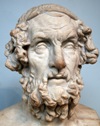 Homer is thought to have lived 800s-700s BCE, a century or two before Thales (born around 624 BCE). Homer’s The Iliad and The Odyssey are magnificent expressions of archaic Greek culture and of incalculable importance to the Greek way of thinking about human life and its place in the universe.
Homer is thought to have lived 800s-700s BCE, a century or two before Thales (born around 624 BCE). Homer’s The Iliad and The Odyssey are magnificent expressions of archaic Greek culture and of incalculable importance to the Greek way of thinking about human life and its place in the universe.
I want to focus on one major event in The Iliad to illustrate a pre-philosophical, yet sophisticated, view of reality.
Why did Hector die?
We can imagine his father Priam in anguish, asking this question. And his wife doing the same. And his son later when he grows up.
Hector died because Achilles killed him.
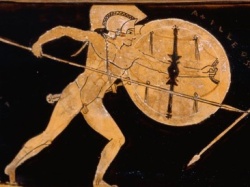 Why did Achilles kill him? The broad context is that the Greeks were at war with the Trojans. The specific context is that Achilles wanted revenge for Patroclus’ death. In each case, we can trace back a causal chain.
Why did Achilles kill him? The broad context is that the Greeks were at war with the Trojans. The specific context is that Achilles wanted revenge for Patroclus’ death. In each case, we can trace back a causal chain.
On the broad context: Why were the Greeks and Trojans fighting? Because Paris and Helen fell in love, Menelaus became a vengeful cuckold, Agamemnon had great ambition for power, Achilles wanted glory, and so on. In Homer’s world we have key motivations that drive human action — Love, Revenge, Power, Glory — played out through these key representative individuals.
On the specific context: Why did Patroclus get killed? Because he was a young man who wanted to prove himself, Achilles was sulking in his tent, Agamemnon had stolen a girl, and so on.
So far all of this is naturalistic explanation in terms of human agency. In a complicated interplay, human desire and motivation and action and reaction cause major events like the Trojan War and specific events like the death of Hector.
But Homer’s story is more complicated, because the gods are also an important part of the causal matrix.
As the great battle between Achilles and Hector is looming, Homer turns our attention to the gods and goddesses, all of whom are watching with great interest. Zeus sees Achilles chasing Hector, and he is torn between love for Hector and admiration for Achilles. Whom should he favor? Zeus finds the tension unbearable and calls upon the others for advice:
“Come you immortals, think this through. Decide.
Either we pluck the man from death and save his life
or strike him down at last, here at Achilles’ hands” (22:206-209)
Athena protests, and Zeus agrees with her that Hector should die, telling her:
“Go.
Do as your own impulse bids you. Hold back no more.”
So he launched Athena already poised for action —
down the goddess swept from Olympus’ craggy peaks. (22: 200-223)
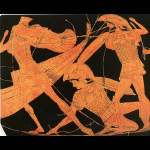 Athena then tricks Hector by impersonating his brother Deiphobus, causing Hector to stop running and allowing Achilles to catch him and kill him.
Athena then tricks Hector by impersonating his brother Deiphobus, causing Hector to stop running and allowing Achilles to catch him and kill him.
Homeric Metaphysics
What then are the metaphysical lessons of Homer’s world?
First, naturalistic human agency alone does not cause events on earth. The gods and goddesses are active participants, and their desires, decisions, and actions are important: Zeus could have decided differently, Athena could have switched her affections, and, consequently, Hector’s fate and the outcome of the Trojan War could have been very different.
Second and closely related: In Homer’s world, the supernatural are the more powerful and important causal force. If the gods decide against something, it will not happen. And if the gods decide something will happen, it will. Human agency is a lesser power.
A third theme in Homer is that the gods and goddesses are often whimsical and divided among themselves. Zeus is often driven by his changeable passions. He gets into quarrels with Athena and the others. There is, consequently, no stable and predictable causal order in the natural world. (There is a notion of Fate operative in Homer, but it’s not consistent and its role is not clear — at least not to me.)
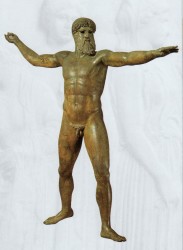 A fourth point worth mentioning concerns ethics in Homer’s world: humans worship the gods not because they are moral but because they are powerful. The gods are far from morally admirable and given to a wide range of vices and foibles. So what is the source and purpose of justice and other morally important realities? Concepts of right and wrong are not foreign to the gods, but the gods are not ethically clear or consistent, either in word or deed. And since humans are also not ethically clear or consistent, the place of morality in the universe is at best tenuous. Amoral power seems to rule both the natural realm and beyond.
A fourth point worth mentioning concerns ethics in Homer’s world: humans worship the gods not because they are moral but because they are powerful. The gods are far from morally admirable and given to a wide range of vices and foibles. So what is the source and purpose of justice and other morally important realities? Concepts of right and wrong are not foreign to the gods, but the gods are not ethically clear or consistent, either in word or deed. And since humans are also not ethically clear or consistent, the place of morality in the universe is at best tenuous. Amoral power seems to rule both the natural realm and beyond.
Abstractly put, we have five implicit metaphysical and ethical theses in Homer’s worldview:
* Supernatural causation is part of the explanation for natural events.
* Supernatural causation is more powerful than natural causation.
* The supernatural is personal.
* Consequently, supernatural causation is sometimes whimsical and so inconsistent and so makes long range prediction unreliable.
* Consequently, ethics is a matter mostly of power — revere gods and kings not because they’re just but because they’re powerful.
 Now we’re ready for the revolution initiated by Thales (ca. 624 – ca. 546 BCE).
Now we’re ready for the revolution initiated by Thales (ca. 624 – ca. 546 BCE).
What if we denied some or all of those five points? What would our account of the world look like?
Philosophy Begins: Thales’ Revolution
Let’s label the five abstracted Homeric themes as follows:
 H1. Supernatural causation is part of the explanation for natural events.
H1. Supernatural causation is part of the explanation for natural events.
H2. Supernatural causation is more powerful than natural causation.
H3. The supernatural is personal.
H4. Consequently, supernatural causation is sometimes whimsical and so inconsistent and so makes long range prediction unreliable.
H5. Consequently, ethics is a matter mostly of power — revere gods and kings not because they’re just but because they’re powerful.
Now let’s return to Thales and the birth of a new worldview:
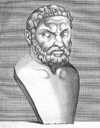 “The first principle and basic nature of all things is water.”
“The first principle and basic nature of all things is water.”
Thales’ first principle is water. If it is water, then it is not the gods. The gods have become at most secondary, so we have at least an implicit challenge to H2.
Also, the basic nature of all things is water. Water is a natural phenomenon, not a supernatural one, so we have at least an implicit denial of H1.
Why water? No doubt Thales has observed the weather cycle, the flowing of rain into streams and eventually to the sea, the critical importance of water to all living things, that water can be transformed from liquid to solid and back and from liquid to gas and back — and that it does so with a regularity. It’s not that nobody had noticed regularities in nature before Thales. But if water is the first principle of all of things, then all of reality is regular. So we have at least an implicit challenge to H4.
We are well on our way to thinking of nature as a self-contained, self-governing, regular physical system of cause and effect.
It’s also clear that Thales’ statement is based on observations of transformations from liquid to gas to solids, and so on. So he is not basing his views on traditional stories handed down through the ages. And he is offering an explanatory hypothesis for those observations. Observation integrated with explanation is a hallmark of a naturalist, philosophical approach.
Subsequent Presocratics argued with Thales. (By contrast, who would ever argue with Homer?) Anaximenes held that fire was a better first-principle candidate than water, as did Heraclitus. Anaximander (my favorite Presocratic) held that having only one basic state of being, whether water or fire, was too reductionist, and so proposed that water, air, earth, and fire were in a cyclical transformation in and out of a “boundless” state. And others entered the fray.
The Presocratics are now using reason in a different way. It’s not clear that they are self-conscious about the new method of thinking. But they are no longer thinking in Homeric principles — and the new thinkers very quickly become incredulous and scornful when the Homeric and other stories are taken as more than fanciful literature. Hecataeus of Miletus (550-489), who died 19 years before the birth of Socrates, is representative:
“What I write here is the account of what I considered to be true. For the stories of the Greeks are numerous and, in my opinion, ridiculous.”
A new way of thinking has begun. Philosophy and the sciences have been launched and flourish quickly.
As for H5 and the development of a philosophical approach to ethics, that story is worth another article, and it involves the innovations of Hesiod and other giants.
* * *
[More of my posts on Intellectual History. The above post connects three posts first published here in 2009. Here is PDF version of the above post, Why Philosophy Begins with Thales.]
Excellent, Dr. Hicks. Thank you.
Thanks a lot, John.
Dear Dr Hicks,
Very interesting.
I wonder whether the term ὕδατος which appears in Genesis is Thales’ “Water”.
Perhaps it’s not so much water — as in H2O — but the universal, physical — non Divine — stuff of matter.
Request: Can you recommend a good book on Thales?
Thanks. Always enjoy reading your articles. 🙂
Hi Prodos. I don’t know of any whole books on Thales. My encounters are with shorter discussions of him and the other Presocratics. If you come across one, please let me know.
Dr. Hicks,
Greetings!
I was very much perplexed finding that rational thinking was said to have begun with Thales. How is that even possible when man is by nature rational?
Having said that, apart from Homer and Hesoid, are there no other representatives of the world of the past that has been termed mythical? Just two is, for me, insufficient a number to make such a generalization.
Hi Atadoga: The claim is that *philosophical* thinking began with Thales. Philosophical thinking is rational yet, as you point out, people have been rational before philosophy began. So philosophy is rationality at (1) a high level of generality and (2) systematicity and (3) with the assumption that one is making cause-and-effect hypotheses that can be argued.